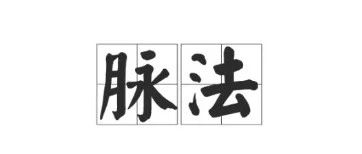Click the blue text above to follow us!


Written by: Xinglin Saodi Sheng
Reflecting on past losses, mourning the untimely death, I diligently seek ancient teachings and gather various methods.■
The first lesson in Traditional Chinese Medicine (TCM) is pulse diagnosis, and the first pulse type is the floating pulse (fu mai). Ancient descriptions of the floating pulse include: “The floating pulse is abundant when lifted and insufficient when pressed” (from the Pulse Classic). It is like a gentle breeze blowing over a bird’s feathers, light and floating (as described in the Inner Canon of Huangdi), or like wood floating on water (Cui’s description), etc. In summary, the pulse is floating at the surface, hence it is called the floating pulse.
Currently, many people have a superficial understanding of the floating pulse as merely being at a shallow position. In fact, the floating pulse represents a heavenly quality, capturing the light and clear image above, focusing on the essence rather than just the pulse’s shallow position.
To grasp the core essence of the floating pulse, two points are crucial: first, the pulse is relatively shallow, easily felt with a light touch, located at the surface, which is “abundant when lifted”. Second, “insufficient when pressed” indicates that the floating pulse lacks the strength of the deeper layers.
By understanding these two points, one can comprehend the floating pulse. Below, I will elaborate on the clinical analysis of the floating pulse to expand everyone’s understanding.
1. Floating Pulse Does Not Solely Indicate Exterior Symptoms
Most people’s impression of the floating pulse is limited to “floating pulse indicates exterior conditions”; however, the floating pulse also indicates deficiency! This is something many overlook.
When the vital energy of the organs is deficient, and the qi fails to contain and absorb, the deficient qi rises to the exterior, resulting in a floating pulse. This situation generally occurs in patients who have long-term insomnia or chronic illnesses that lead to internal damage of vital energy.
The floating pulse can coexist with other pulse types and can indicate various syndromes.
2. Floating Pulse by Location
The floating pulse at the cun (寸) position is floating and weak, indicating internal injury and deficiency.
The floating pulse at the cun position is floating and normal, indicating a strong constitution, occasionally feeling wind-cold.
The floating pulse at the cun position is floating and large, indicating heat in the Yangming channel.
The floating pulse at the renying (人迎) position is large and firm, indicating excess Yang qi and invasion of wind-heat.
The floating pulse at the taixi (太溪) position indicates depletion of vital energy, with kidney qi rising.
3. Floating Pulse Patterns
Isolated floating pulse at the cun position indicates an external pathogen in the defensive layer.
Isolated floating pulse at the guan (关) position indicates spleen and stomach injury from overwork.
Isolated floating pulse at the chi (尺) position indicates insufficient essence and blood, with internal movement of fire.
Floating pulse at the cun position, with a deep guan pulse, indicates lung heat and shortness of breath.
Floating and wiry pulse at the cun position indicates liver fire rebelling against the lung, with wood fire attacking metal.
Deep and wiry pulse at the cun position, with a floating chi pulse, indicates excess above and deficiency below.
Floating and thin pulse at the cun position indicates excessive sweating damaging Yang, with both qi and yin injured.
Floating and wiry pulse at the guan position indicates liver fire rising.
Floating and large guan pulse, with a thin chi pulse, indicates intense liver fire, damaging kidney yin.
Floating and slippery guan pulse indicates stagnation of food qi in the stomach.
Floating and wiry pulse at the left guan, with a large right guan pulse, indicates excess liver and stomach fire.
Floating and wiry pulse at the right guan, with a large left guan pulse, indicates liver qi invading the stomach or disharmony between liver and spleen.
Floating cun pulse, with a weak renying pulse, indicates excess yin and deficiency of Yang.
Weak cun pulse, with a large renying pulse, indicates excess Yang and deficiency of yin or insufficient organ qi with external pathogens.
4. Floating Pulse by Season
In spring, vitality is flourishing, with wind qi prevailing, the pulse is floating and slightly wiry, indicating the presence of the stomach and spirit, representing the correct pulse.
Floating and wiry pulse indicates insufficient liver yin, with internal disturbance from wind-wood.
In summer, heat is intense, summer belongs to fire, internally connected to the heart, the summer floating pulse is floating with moisture, indicating the correct pulse of summer heat. Moist and short of breath, with restlessness, indicates excessive summer heat disturbing the heart and spleen.
In autumn, belonging to metal, metal signifies transformation, which disperses; thus, the pulse is floating, gentle, and regular, indicating the correct pulse. If floating and rapid, it indicates fire overcoming metal, with dry heat as a disease.
In winter, with water freezing and the earth cracking, all things are hidden; the pulse should not be floating but should be deep. External cold and internal injury from sexual activity can lead to a floating pulse in winter.
Welcome to follow and promote the inheritance and development of TCM.
Previous Recommendations
▶My understanding of the clinical observation of fissured tongue.
▶My insights on pulse diagnosis: renying for Yang, cun for Yin, taixi for true Yin.
▶From my participation in the “High-Speed Rail Emergency Rescue Operation”, observing the advantages of TCM in handling common emergencies.
▶A 70-year-old man experiences regular fever—sweating—defervescence every night; a stable treatment method showcases the charm of TCM!
▶Suddenly realizing “menstrual irregularities, treatment from both ends”; it turns out that the master of national medicine has been treating this way for a long time.
▶Hearing buzzing in the head at night; TCM can treat this in such a way, ancient wisdom is truly remarkable!
▶Occasionally fasting can be more beneficial than consuming ginseng.
▶Snoring too loudly harms oneself and others; a certain Chinese patent medicine can alleviate this.
▶Children’s calming method: endure a little hunger, better than taking digestive tonics; withstand a little cold, no need for external release.
▶Reflections from Dr. Ren in Beijing on the application of “The Dao that can be told is not the eternal Dao” in TCM theory.
▶Skin allergies and unbearable itching; this formula resolved it in four days.
▶If a doctor wants to make money, it can be done in an instant; just give up one thing.
▶Stroke hemiplegia—Xian Chuan Shi Guo Gong’s wine-soaked formula.
▶Ancient formula for stroke hemiplegia—Jiu Zhi Xi Xian Wan.
▶Ancient formula for stroke—Tie Dan Wan.
▶Stroke life-saving modification method.
▶Ancient formula for life-saving elixir.

